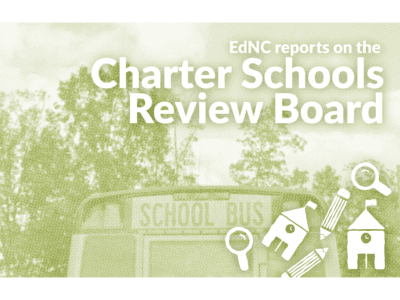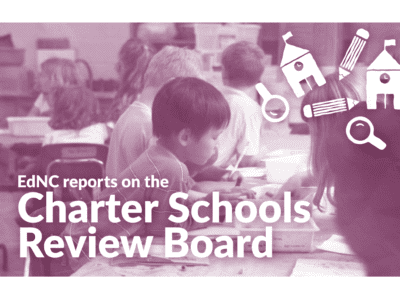
In a 6-5 vote, the North Carolina Charter Schools Review Board (CSRB) narrowly approved an amendment allowing TMSA Triangle, a Wake County charter school, to expand across county lines and open a K-8 sub-campus in Durham. It’s a novel approach to charter expansion that required no application.
The vote took place on Monday, Sept. 8, the first of CSRB’s two-day monthly meeting.
Currently, TMSA Triangle operates two Wake County campuses, in Cary and Apex. The larger TMSA Public Charter Schools network that oversees TMSA Triangle serves over 6,100 students across eight campuses, according to TMSA’s website.
Now, CSRB approval will allow TMSA Triangle to operate three campuses in two counties in 2026, all under the same charter.
![]() Sign up for the EdDaily to start each weekday with the top education news.
Sign up for the EdDaily to start each weekday with the top education news.
The “sub-campus” request generated extended CSRB discussion. Even as members applauded TMSA’s strong academic record, some members expressed concern about allowing school expansion through a simple amendment.
“I’m not sure I really like this idea of, ‘I open a sub-campus in a different district and just call it a way of expanding that requires a quick 10 slides, an executive summary, and 20 minutes of deliberation,’” said CSRB member Eric Sanchez. “I think that’s a loophole in the process that I’m not sure I’m OK with.”
Other members viewed the sub-campus route as a viable path for strong schools to grow, without requiring them to go through a lengthy charter application.
“If we’re going to see the charter school movement expand in North Carolina, we’re going to have to have some kind of options like this,” said CSRB member Lindalyn Kakadelis. “I’m very much in favor of having this kind of option for schools that we know very well and have performance.”
CSRB members also interviewed five 2025 applicants over the two-day meeting, approving one fast-track charter replication and two accelerated charter applicants. The CSRB denied one accelerated applicant and asked another to return in October.
In addition, the CSRB reelected Bruce Friend as chair and John Eldridge as vice chair and welcomed Eric Guckian and Gerald McNair as regular voting members. Guckian is a State Board of Education appointee, while McNair is a Senate appointee.
Charter amendments
CSRB discussion around TMSA’s sub-campus amendment revealed a need for more clarity and guidance.
According to Office of Charter Schools (OCS) executive director Ashley Baquero, who provided background to EdNC following CSRB’s meeting, charter law does not directly address sub-campus expansion. As a result, OCS has relied on terminology in the EDDIE school directory, which denotes a “sub-campus” as a campus building that is not located at the school’s primary address. OCS has also used charter relocation statute as a route to track campus expansion.
The first approval of a second or “sub-campus” in another county occurred in December 2024, OCS said. At that time, the CSRB approved a TMSA amendment requesting expansion and relocation from Mecklenburg County to Cabarrus County. TMSA sought to relocate a secondary campus and add another elementary campus.
In launching the discussion at this week’s meeting, Eldridge asked the CSRB to consider terminology, and what is meant by expansion that occurs via replication, which requires an application, versus a sub-campus.
“Sub-campus could be seen as … avoiding the process of having to go through the application process for a new school,” he said.
“I wondered why this didn’t come as a fast-track replication in another city,” said CSRB member Rita Haire. “I guess you start scanning the landscape. Are there other networks of charter schools that may do the same thing?”
It feels like “another complete area of approval,” she added.
Recent legislative developments have made it much easier for high-performing charter schools to expand. A 2023 law removed enrollment growth caps for charter schools that are not low-performing. In addition, the General Assembly last year authorized recurring funding for public school enrollment growth, including charter schools.
Eldridge asked attorney Steven Walker, installed on Monday as general counsel for the CSRB, for his legal input.
“Is there anything that’s a barrier to using a term like sub-campus to get … the expansion of an existing charter?” Eldridge asked.
“I don’t see a legal issue with it, just because of the precedent that there (have) been multiple other schools that have more than one campus under the same charter,” Walker responded.
However, during that timeframe, Walker said, charter schools had different restrictions on growth.
“Now you’re kind of in an unlimited growth era, especially for a school like TMSA that is knocking it out of the park,” he said. “They have no limits on their growth.”
Family demand for TMSA Triangle is high. In his presentation to the CSRB, TMSA Superintendent Ben Karaduman said the charter school’s 2025-26 waitlist included 2,027 students.
While CSRB members disagreed about the best course of action regarding TMSA’s amendment, they were unified about the need to set criteria for sub-campus expansion. The CSRB will establish a new sub-committee for that purpose.
The CSRB also approved a raft of other amendments in addition to TMSA’s request.
West Triangle High School, currently in its third delay year, requested and received permission to relocate to Durham for its 2026 opening. The school had planned to open in Orange County but faced setbacks in securing a suitable property there.
The relocation is within 10 miles of the current planned campus, Friend said, but the request came before the CSRB because the school’s relocation crosses county lines.
According to a new 2025 law, charter schools may relocate without CSRB approval as long as the new campus is within 10 miles of the current campus and in the same school district. Relocations that are further away or in another district require CSRB approval.
Six schools also secured approval for mission statement amendments: Iredell Charter Academy of Arts and Science, Institute for the Development of Young Leaders (Durham), New Dimensions School, Faith Academy, Clover Garden School, and North Carolina Cyber Academy.
In addition, the CSRB approved requests from The Experiential School of Greensboro and Voyager Academy to participate in the National School Lunch Program.
Read more
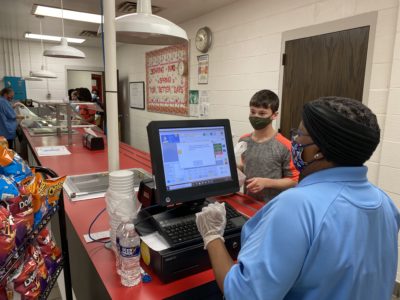

New charter applicants
During interviews with five charter applicants, the CSRB considered three possible actions: approve, deny, or request a second interview.
The CSRB voted to approve three applicants, all of whom plan an August 2026 launch. The first, a fast-track replication of the Institute for the Development of Young Leaders in Durham, plans to open in Wake County. Initially, IDYL in Wake County will open as a K-6 school, eventually growing to a K-8 school, according to IDYL’s OCS profile.
State regulatory guidelines indicate that the replication option is available to a nonprofit board “to replicate either its own successful model, or to employ an educational management company (EMO) or charter management organization (CMO)” to replicate a successful model. IDYL is not working with an EMO or CMO.
For an applicant operating a school in North Carolina and seeking fast-track replication, eligibility hinges directly on the school’s record, which must include academic performance on par with, or better than, the local district; three years of meeting or exceeding growth; three years of unqualified audits; resolution of compliance issues; and a board comprised primarily of North Carolina residents.

In addition to IDYL’s replication, the CSRB also approved two accelerated applications: BH2 Stream Academy in Edgecombe County and RYZE Academy in Forsyth County.
BH2 Stream, which has a lease agreement with a church in Tarboro, plans to open as a K-6 school, according to its OCS profile. The school will also use a weighted lottery. Dr. Joanne Woodard, the founder and executive director of Sallie B. Howard School, will mentor the school’s team, leaders said.
Multiple community members were present on Tuesday to support BH2 Stream’s application, and they erupted into cheers following the favorable vote.
RYZE has a lease agreement with a church in High Point, according to its OCS profile. The school will launch with grades K-4 and also plans to implement a weighted lottery.
RYZE was born from “a deep understanding of the urgent and unmet needs” in the area, said board chair Aniya Mayo.
Both BH2 Stream and RYZE plan expansion to grades K-8.
Like standard applicants, accelerated applicants participate in a planning year. However, their planning year takes place during the year in which their applications are reviewed. Accelerated applicants must secure a facility under their expedited timeline, according to state regulation outlined below.
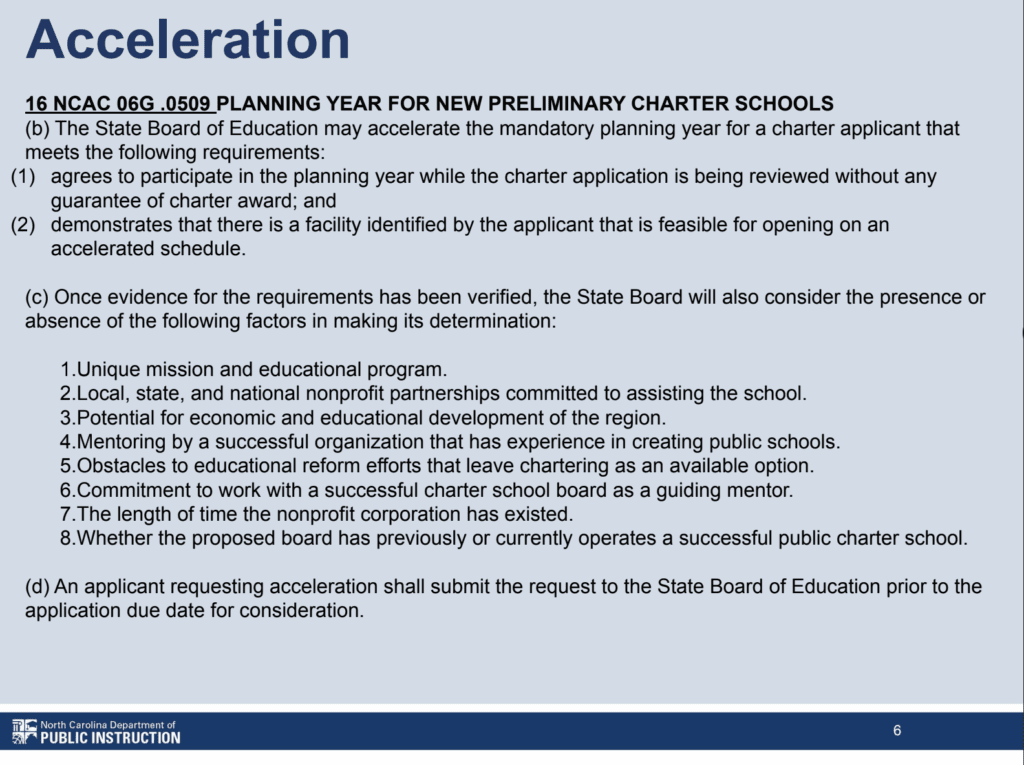
Focus Academy Charter School, a Wake County accelerated applicant that hopes to serve K-4 students and grow to K-8, according to its OCS profile, will return for a second interview in October. The CSRB denied the prospective charter’s application last year — and was not satisfied with school leaders’ answers this month regarding the school’s relationship with CMO American Traditional Academies.
The CSRB denied the application from Ascent Classical Academy of Moore County, a school that hoped to open as a K-8 model and grow to K-12, according to its OCS profile. In its application, the school, a replication of Ascent Classical Academy of Northern Colorado, requested to open on an accelerated timeline. However, Ascent leaders came to September’s meeting asking to revise that timeline and become a standard applicant “due to unexpected facility issues.”
The CSRB denied that request, with some members unpersuaded Ascent had presented sufficient evidence to warrant consideration as a standard applicant. A subsequent vote on the school’s accelerated application was also denied. Ascent failed to meet accelerated applicant criteria with its facility plan, according to the CSRB, and delays from the school precluded an OCS site visit.
Ascent may appeal the CSRB’s decision to the State Board of Education.
Enrollment update and session law review
In her director’s update, Baquero shared enrollment numbers for new schools as well as the impact of recent session law on CSRB authority.
As of Sept. 5, figures show new schools have fallen short of enrollment targets.
This year, Baquero said, “everyone came in under projection, and some significantly under projection.”
Several schools are hovering just above the state’s mandated 80-student minimum for charter schools. One school, Liberty Charter Academy, is well above that threshold but far below projected enrollment, with just one-fourth of expected students enrolling.
Here is the OCS enrollment chart:

Current enrollment at Anderson Academy was not a concern for the CSRB. That school, which operates on the campus of a residential care home, received earlier CSRB permission to operate below the 80-student minimum.
Other enrollment figures were concerning, however.
“I look at this data, and I see two things happening here. One is in legislation you have to have 80 (students),” Friend said. “So, there are some schools here that are in jeopardy of not meeting that threshold.”
“Then you have the second issue here or concern,” Friend said, referencing Liberty’s significant enrollment shortfall. “How do you possibly adjust your budget that much?”
“We’ve got to get these schools in here as soon as possible,” he said of schools barely above the minimum enrollment threshold and thus in danger of mid-year closure.
“This is a national issue,” Eldridge said of newer charters’ enrollment struggles. “I think charter schools nationally are starting to struggle with year one and year two enrollment.”
One strategy that OCS plans to implement to help with enrollment, Baquero said, is to bring schools before CSRB in May as well as June for Ready to Open discussions and approval. CSRB members also discussed having schools hold admission lotteries earlier.
In her update, Baquero also said five schools will begin RTO training this month. Here is this year’s RTO cohort:
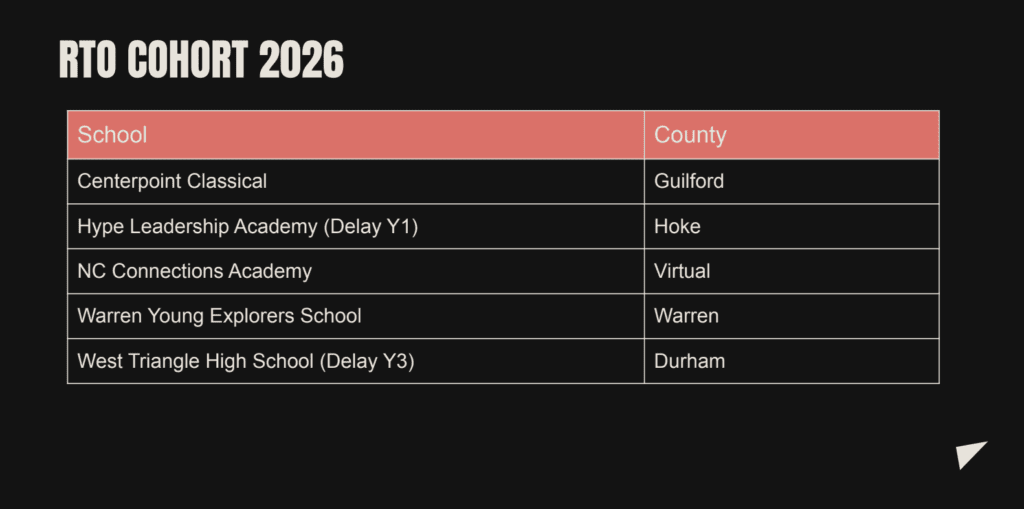
The two accelerated applicants approved this month will join RTO training. Since IDYL was approved as a fast-track replication, such training is optional. However, that school must participate in at least a one-day training, according to OCS.
All of these schools will return to the CSRB for a final approval vote in the spring, OCS said.
Baquero also outlined provisions under new session law, which “greatly expands” the power of the CSRB. Here are some key provisions in the new state law:
- The CSRB must first approve any rule or policy impacting charter schools, prior to State Board of Education adoption.
- The OCS director reports to the CSRB rather than the state superintendent.
- Charter relocation within a 10-mile radius of the location specified in a school’s charter does not require CSRB approval, as long as the campus is in the same school district.
- Charter schools have flexibility with teacher evaluation tools, provided they reflect standards similar to tools utilized by districts.
- The CSRB requires low-performing or continually low-performing charter schools to “prepare and report on” improvement plans.
- The CSRB, rather than the state superintendent, creates a “standardized enrollment verification and transfer request document” and a “standardized procedure” for transferring local funds to charter schools.
- The Department of Public Instruction must fund required financial data reporting platforms during a charter school’s first year.
- Charter schools operating remote academies with 250 or more students may request a separate charter, without a planning year.
- Brick-and-mortar charters that also operate remote academies will receive separate school performance grades for each model.
Read more
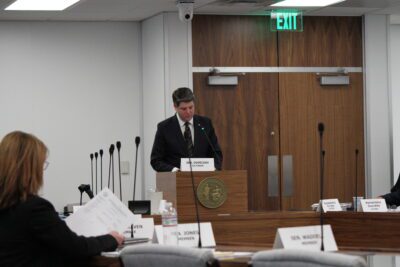
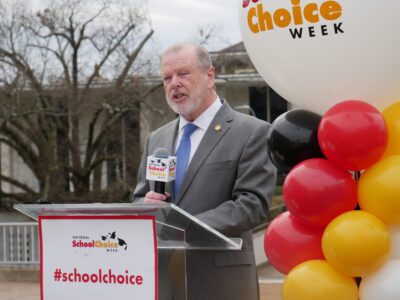

Renewal stipulations and other business
OCS also provided a progress update on six charter schools with stipulations on their renewals. Stipulations are around school improvement, training, academic growth, or compliance.
These are the six schools with stipulations: Paul R. Brown Leadership Academy, Rocky Mount Prep, ZECA School of Arts and Technology, Monroe Charter Academy, Next Generation Academy, and Community School of Digital and Visual Arts (CSDVA). Except for CSDVA, all of these schools are up for renewal in 2026, according to OCS.
While academic growth is a challenge for two schools, OCS noted, all stipulation schools met or exceeded growth in 2024-25. Three schools were placed on financial noncompliance while under stipulations, but only one is still in non-compliance.
CSRB also discussed revisions to the 2026 charter application. The review process has included input from CSRB members as well as public comment. A vote on final revisions is set to take place next month.
Former CSRB member Dave Machado, the executive director of the North Carolina Coalition for Charter Schools, shared highlights from the Coalition’s 2024 Annual Report. An advocacy organization that represented 94 member schools in 2024, the Coalition exists to protect and promote public charter schools, Machado noted in his presentation.
“We want to make sure that we are advocating at the General Assembly for charter school laws that make sense, try to stop charter school laws that don’t make sense, and just making sure that we are moving the charter school movement (the) best we can,” he said.
Finally, Lindsay Phillips and Dr. Jake Wilson joined the CSRB this month as board advisers. Phillips is the 2025 Charter School Teacher of the Year, while Wilson is the 2025 Charter School Principal of the Year. Both work at Mountain Island Charter School in Mount Holly.
The CSRB meets next Oct. 6-7.
Editor’s Note: EdNC has retained Kristen Blair to cover the monthly meetings of the Charter Schools Review Board in 2025. Kristen currently serves as the communications director for the North Carolina Coalition for Charter Schools. She has written for EdNC since 2015, and EdNC retains editorial control of the content.
Recommended reading

